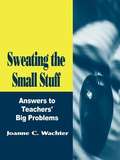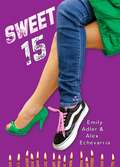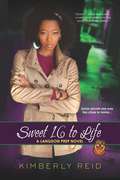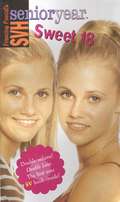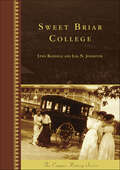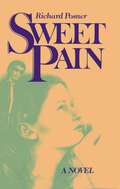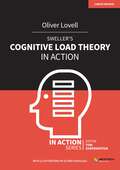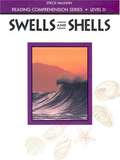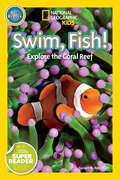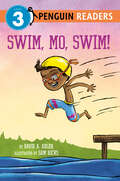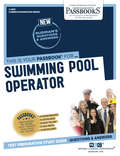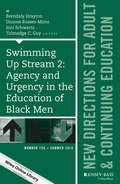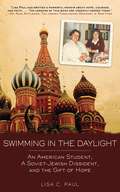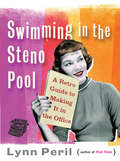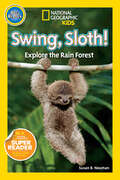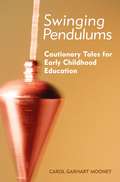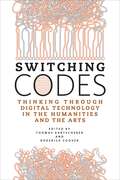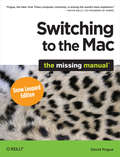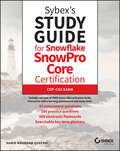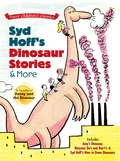- Table View
- List View
Sweating the Small Stuff: Answers to Teacher's Big Problems
by Joanne C. WachterThis survival guide for primary teachers gives practical advice on the common questions all new teachers have.
Swede Dreams
by Eva ApelqvistIn order to get away from her twin sister, and to be with her boyfriend who was a Swedish exchange student at her school, Calista spends a semester in Sweden, where she learns more than just the language and culture of this Scandinavian country.
Sweet 15
by Emily Adler Alex EchevarriaShortly before her fifteenth birthday, Destiny Lozada's traditional Puerto Rican mother and feminist older sister hijack her quinceañera, each pushing her own agenda and ignoring the possibility that Destiny, a skateboarding tomboy, might have her own ideas about the coming-of-age ritual she is about to participate in.
Sweet 16 to Life
by Kimberly ReidThanks to skills learned from her undercover-cop mom, Chanti Evans has saved lives and exposed lies at her exclusive private school. But taking down Langdon Prepsters is one thing. Does she have what it takes to go up against hardcore criminals?After a semester with Langdon's most rich and snobby, Chanti knows all too well that trust is tough to find and keep. So when her old hood friend, MJ, turns to her for help, Chanti is determined to protect her from vengeful gang member Lux. But that means mending fences with her irresistible ex-boyfriend, Marco, and enlisting his very reluctant assistance. And when Lux suddenly vanishes, Chanti and MJ become prime suspects. Now to clear their names, she must uncover secrets that will strike much too close to home, putting her place at Langdon--and her future--on the line. . . Watch out Nancy Drew. . . Chanti Evans from the 'hood is the hot new sleuth in town! --Simone Elkeles, New York Times bestselling authorChanti will show why you keep your friends close and your frenemies closer. --Ni-Ni Simone on My Own Worst FrenemyChanti is smart and funny. . . a welcome addition to the world of teen mysteries. --Kirkus
Sweet 18 (Sweet Valley High Senior Year #48)
by Francine PascalElizabeth can't believe she's finally turning 18 and graduating high school. She can't wait to say good-bye to the past and start a new life. And the best part of it all--she gets to do it with her twin sister. But for Jessica, the only thing worse than turning 18 is turning 18 and graduating in the same week. What if she's not ready for her entire life to change--or for losing her sister? Original.
Sweet Briar College (Campus History)
by Lynn Rainville Lisa N. JohnstonOn October 29, 1900, Indiana Fletcher Williams died, leaving her 8,000-acre plantation estate and almost $1 million to create the Sweet Briar Institute.Later renamed Sweet Briar College, it was founded by Williams to honor her daughter, Maria Georgiana "Daisy" Williams, who died tragically in 1884 at age 16. For over a century, Sweet Briar has recruited dedicated faculty and staff to teach exceptional students. The school's award-winning lands include old-growth forests, rare arboreal and floral species, scenic hiking and riding trails, and two lakes. Complementing these natural resources are beautiful campus buildings, many of which are listed in national and state historic registers. Each of these features is rare for a college campus; taken together, they compose the rich physical and community heritage of a historic college that celebrates its 115th birthday in 2016
Sweet Pain
by Richard PosnerCasey Gordon is lean and limber, a 17-year-old senior at Westfield High School. Casey is a bright, energetic, caring girl but she seems to need to be hurt. She injures herself a little too much in track competitions and she always falls in love with real losers. She doesn&’t really understand the conflicts inside of her and the feelings of unworthiness that set her up to get involved with Paul VanHorn.Paul is nineteen, and he graduated—under a cloud of scandal—from her high school the year before. Instead of going to college, he does construction work. A mysterious, attractive boy just over six feet and powerfully built, he is well-read, intelligent, and even romantic. He charms Casey and he pays attention to her deepest needs. But he comes from a terrible home—his father is an abusive alcoholic and his mother a submissive, suffering victim.
Sweeter Than Honey, Richer Than Gold: A Guided Study of Biblical Poetry (Reading the Bible as Literature)
by Leland RykenThis is the second of a projected six-volume series called Reading the Bible as Literature (the first volume being How Bible Stories Work). An expert at exploring the intersection of the Bible and literature, Ryken shows pastors and students and teachers of the Bible how to appreciate the craftsmanship and beauty of biblical poetry and how to interpret it correctly. Dr. Ryken goes one step further than merely explaining the genre of poetry-he includes exercises to help students master this rich literary treasure.
Sweetgrass Basket
by Marlene CarvellIn alternating passages, two Mohawk sisters describe their lives at the Carlisle Indian Industrial School, established in 1879 to educate Native Americans, as they try to assimilate into white culture and one of them is falsely accused of stealing.
Sweller's Cognitive Load Theory in Action (In Action)
by Tom Sherrington Oliver LovellWhat is it that enables students to learn from some classroom activities, yet leaves them totally confused by others? Although we can't see directly into students' minds, we do have Cognitive Load Theory, and this is the next best thing. Built on the foundation of all learning, the human memory system, Cognitive Load Theory details the exact actions that teachers can take to maximise student outcomes.Written under the guidance, and thoroughly reviewed by the originator of CLT, John Sweller, this practical guide summarises over 30 years of research in this field into clear and easily understandable terms. This book features both a thorough discussion of the core principles of CLT and a wide array of classroom-ready strategies to apply it to art, music, history, chemistry, PE, mathematics, computer science, economics, biology, and more.
Sweller's Cognitive Load Theory in Action (In Action)
by Tom Sherrington Oliver LovellWhat is it that enables students to learn from some classroom activities, yet leaves them totally confused by others? Although we can't see directly into students' minds, we do have Cognitive Load Theory, and this is the next best thing. Built on the foundation of all learning, the human memory system, Cognitive Load Theory details the exact actions that teachers can take to maximise student outcomes.Written under the guidance, and thoroughly reviewed by the originator of CLT, John Sweller, this practical guide summarises over 30 years of research in this field into clear and easily understandable terms. This book features both a thorough discussion of the core principles of CLT and a wide array of classroom-ready strategies to apply it to art, music, history, chemistry, PE, mathematics, computer science, economics, biology, and more.
Swells and Shells: Reading Comprehension Level D
by Steck-Vaughn StaffRead an exciting story while learning more about good reading comprehension.
Swim, Fish!: Explore the Coral Reef (National Geographic Kids Readers)
by Susan B. NeumanHooray! We're going to the beach! Do you know what kind of animals live in the ocean? You'll see fish swim, dolphins leap, and jellyfish float by. Told in simple yet lively text built with sight words and using picture icons to aid reading, National Geographic Pre-readers will enchant kids just beginning their journey with books.
Swim, Mo, Swim! (Mo Jackson #5)
by David A. AdlerMo is going swimming in the perenially popular, Geisel Award–winning readers series by David A. Adler, now with a fresh look!It's Field Day at summer camp and Mo's group, the Guppies, is competing for extra ice cream! He and his friends are doing their best at everything from the three-legged race to the potato sack race, and as the day nears its end, each group has won one medal each. It's all on Mo to break the tie in the final event: swimming!
Swimming Pool Operator: Passbooks Study Guide (Career Examination Series)
by National Learning CorporationThe Swimming Pool Operator Passbook® prepares you for your test by allowing you to take practice exams in the subjects you need to study. It provides hundreds of questions and answers in the areas that will likely be covered on your upcoming exam, including but not limited to: tools and their use; operation and maintenance of swimming pools and related facilities and equipment including: filtration/circulation systems, maintenance and operation, accessories and associated trades, concrete, shotcrete and gunite; erosion and sedimentation control; cleanliness and safety in swimming pool areas; and more.
Swimming Up Stream 2: Agency And Urgency In The Education Of Black Men (J-B ACE Single Issue Adult & Continuing Education)
by Brendaly Drayton Talmadge C. GuyThis volume is the continuation of a two-part series that focuses on salient topics and issues affecting Black males as they engage in adult education and learning. Considering the historical and current effects on the way these men participate in adult education, this volume broadens the conversations around adult Black males’ educational experiences by utilizing academic research as well as program descriptions and personal narratives with a concern for the “lived experiences.” More specifically, the authors explore: the agency of Black men in carving out pathways to success, the programs that support these endeavors, and the role of civil society in facilitating or inhibiting their progress. Topics covered include the digital divide, sports, professional career development, sexuality, role of religion, college as a choice, and the Black Lives Matter initiative. Practitioners will be encouraged toreflect on their own practices as they work toward engagement of Black males in learning communities.This is the 150th volume of the Jossey Bass series New Directions for Adult and Continuing Education. Noted for its depth of coverage, it explores issues of common interest to instructors, administrators, counselors, and policymakers in a broad range of education settings, such as colleges and universities, extension programs, businesses, libraries, and museums.
Swimming in the Daylight: An American Student, A Soviet-Jewish Dissident, and the Gift of Hope
by Lisa C. PaulThere is always some part of the world where human rights are trampled and oppression quashes the human spirit. In the 1980s, it was the Soviet Union. In Swimming in the Daylight, Lisa Paul, a Catholic-American student living in Moscow in the early '80s, details how she grew to understand the perverse reality of the pre-Gorbachev Soviet regime as her friendship with her Russian-language tutor, Inna Kitrosskaya Meiman, blossomed. Inna, a Soviet-Jewish dissident and refusenik, was repeatedly denied a visa to receive life-saving cancer treatment abroad. The refusal was an apparent punishment imposed on both her and her Jewish husband, Naum, for his participation in the Moscow Helsinki Watch Group-the lone group fighting for human rights in the U. S. S. R. Before Lisa returned to the United States, she promised Inna she would do all she could to get her out of Moscow. But Lisa was one person, what could she possibly do that would make a difference? Inspired by her faith and rights as an American, Lisa staged a hunger strike, held press conferences, and galvanized American politicians to demand Inna's immediate release. In this heartfelt, compassionate, and inspiring narrative, Lisa brings the reader along with her as she learns indelible lessons from her heroic teacher. Inna's greatest lesson-that it is possible to swim through treacherous waters, in daylight, not in despair-is as relevant today as it was during the final years of the Soviet regime. At a time when international strife seems insurmountable and worries at home seem to paralyze, this story will teach people everywhere that it is the courage inside, not the chaos outside, that defines us.
Swimming in the Steno Pool: A Retro Guide to Making It in the Office
by Lynn PerilFeed your boss’s ego. Dress for success. And don’t let your heels trip you up on the corporate ladder. Millions of women have held the position of secretary, alternately lauded as a breakthrough opportunity and excoriated as dead-end busy work. From the female pioneers who infiltrated Capitol Hill offices during the Civil War to today’s tech-savvy administrative assistants, secretaries have withstood criticism for abandoning their rightful sphere (the home), weathered the dubious advice of secretarial guide-books, taken hits from feminists and antifeminists alike, and demanded the right to resist making coffee—all while making their bosses look good. In Swimming in the Steno Pool, author-secretary Lynn Peril profiles the various incarnations of the secretary, from pliable, sexy mate of the "office husband" to postfeminist executive-in-training, drawing inspiration from a wide range of "femorabilia" and secretarial guidebooks of yesteryear. Featuring an array of fabulous illustrations promoting office equipment and office girls alike, Peril delivers a feisty, witty celebration of the women who’ve been running the show for decades.
Swimming with Faith: The Missy Franklin Story (ZonderKidz Biography)
by Natalie Davis MillerMissy Franklin is one of the most talented swimmers in the world. She is a four-time Olympic gold medalist and currently holds the world record in the 200-meter backstroke and American records in both the 100-meter and 200-meter backstroke. She was Swimming World’s World Swimmer of the Year and was awarded the American Swimmer of the Year award in 2012. Swimming with Faith: The Missy Franklin Story details her rise in fame as a swimmer and humbleness in the sport and in her personal life.
Swing, Sloth!: Explore the Rain Forest (National Geographic Kids Readers)
by Susan B. NeumanCome along on an adventure through the rain forest. Along the way, you'll meet new friends big and small, see amazing sights, and learn all about the creatures that make their home in the rain forest. Told in simple yet lively text built with sight words and using picture icons to aid reading, National Geographic Pre-readers will enchant kids just beginning their journey with books.
Swinging Pendulums
by Carol Garhart MooneyFilled with more than twenty-five essays on familiar topics to those who care for and teach young children, Swinging Pendulums is sure to stir discussion, support policy revision, and help early childhood professionals find the middle ground on issues in early childhood education. These thought- and discussion-provoking essays feature topics and trends in early childhood education including health, discipline, curriculum, professional development, use of media, ratios and group size, and more.Carol Garhart Mooney, a college instructor in early childhood education, is also the author of Theories of Childhood, Theories of Attachment, and Use Your Words.
Switching Codes: Thinking Through Digital Technology in the Humanities and the Arts
by Thomas Bartscherer Roderick CooverHalf a century into the digital era, the profound impact of information technology on intellectual and cultural life is universally acknowledged but still poorly understood. The sheer complexity of the technology coupled with the rapid pace of change makes it increasingly difficult to establish common ground and to promote thoughtful discussion. Responding to this challenge, Switching Codes brings together leading American and European scholars, scientists, and artists--including Charles Bernstein, Ian Foster, Bruno Latour, Alan Liu, and Richard Powers--to consider how the precipitous growth of digital information and its associated technologies are transforming the ways we think and act. Employing a wide range of forms, including essay, dialogue, short fiction, and game design, this book aims to model and foster discussion between IT specialists, who typically have scant training in the humanities or traditional arts, and scholars and artists, who often understand little about the technologies that are so radically transforming their fields. Switching Codes will be an indispensable volume for anyone seeking to understand the impact of digital technology on contemporary culture, including scientists, educators, policymakers, and artists, alike.
Switching to the Mac: The Missing Manual (Missing Manual)
by David PogueIs Windows giving you pause? Ready to make the leap to the Mac instead? There has never been a better time to switch from Windows to Mac, and this incomparable guide will help you make a smooth transition. New York Times columnist and Missing Manuals creator David Pogue gets you past three challenges: transferring your stuff, assembling Mac programs so you can do what you did with Windows, and learning your way around Mac OS X.Learning to use a Mac is not a piece of cake, but once you do, the rewards are oh-so-much better. No viruses, worms, or spyware. No questionable firewalls, inefficient permissions, or other strange features. Just a beautiful machine with a thoroughly reliable system. Whether you're using Windows XP or Vista, we've got you covered. If you're ready to take on Mac OS X Snow Leopard, the latest edition of this bestselling guide tells you everything you need to know:Transferring your stuff -- Moving photos, MP3s, and Microsoft Office documents is the easy part. This book gets you through the tricky things: extracting your email, address book, calendar, Web bookmarks, buddy list, desktop pictures, and MP3 files.Re-creating your software suite -- Big-name programs (Word, Photoshop, Firefox, Dreamweaver, and so on) are available in both Mac and Windows versions, but hundreds of other programs are available only for Windows. This guide identifies the Mac equivalents and explains how to move your data to them.Learning Snow Leopard -- Once you've moved into the Mac, a final task awaits: Learning your way around. Fortunately, you're in good hands with the author of Mac OS X: The Missing Manual, the #1 bestselling guide to the Macintosh.Moving from Windows to a Mac successfully and painlessly is the one thing Apple does not deliver. Switching to the Mac: The Missing Manual, Snow Leopard Edition is your ticket to a new computing experience.
Sybex's Study Guide for Snowflake SnowPro Core Certification: COF-C02 Exam
by Hamid Mahmood QureshiPrepare smarter, faster, and better with the premier study guide for Snowflake SnowPro Core certification Snowflake, a cloud-based data warehousing platform, has steadily gained popularity since its 2014 launch. Snowflake offers several certification exams, of which the SnowPro Core certification is the foundational exam. The SnowPro Core Certification validates an individual's grasp of Snowflake as a cloud data warehouse, its architectural fundamentals, and the ability to design, implement, and maintain secure, scalable Snowflake systems. Sybex’s Study Guide for Snowflake SnowPro Certification delivers comprehensive coverage of every relevant exam topic on the Snowflake SnowPro Core Certification test. Prepare efficiently and effectively for the exam with online practice tests and flashcards, a digital glossary, and concise and easy-to-follow instruction from the subject-matter experts at Sybex. You'll gain the necessary knowledge to help you succeed in the exam and will be able to apply the acquired practical skills to real-world Snowflake solutions. This Study Guide includes: Comprehensive understanding of Snowflake's unique shared data, multi-cluster architecture Guidance on loading structured and semi-structured data into Snowflake Utilizing data sharing, cloning, and time travel features Managing performance through clustering keys, scaling compute up, down & across Steps to account management and security configuration including RBAC & MFA All the info you need to obtain a highly valued credential for a rapidly growing new database software solution Access to the Sybex online learning center, with chapter review questions, full-length practice exams, hundreds of electronic flashcards, and a glossary of key terms Perfect for anyone considering a new career in cloud-based data warehouse solutions and related fields, Sybex’s Study Guide for Snowflake SnowPro Certification is also a must-read for veteran database professionals seeking an understanding of one of the newest and fastest-growing niches in data.
Syd Hoff's Dinosaur Stories and More
by Syd HoffFrom Syd Hoff, famed creator of Danny and the Dinosaur, comes this collection of three rare books: Amy's Dinosaur features a forward-looking ecological theme. When Amy and her friends take a walk in the woods, they see lots of trash but no living creatures — until they meet a dinosaur who can't stand to see the Earth endangered once again and encourages the kids to help him clean up.Dinosaur Do's and Don't's, a gentle and humorous primer on manners, advises children to get out of bed when mother calls, bathe without being told, ask permission to go out and play, say thank you, and engage in other polite practices.How to Draw Dinosaurs, an easy-to-follow guide to sketching dinosaurs just like Syd's, features diagrams that show four easy steps to creating a stegosaurus, dimetrodon, archaeopteryx, triceratops, and other well- and lesser-known prehistoric animals.
